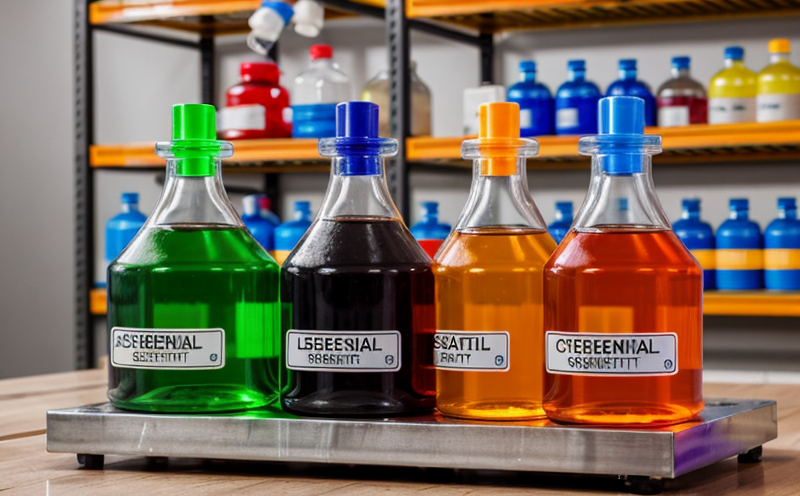Bisphenol S (BPS) Testing in Consumer Products
Bisphenol S (BPS), a close chemical cousin to Bisphenol A (BPA), is a widely used monomer in the production of plastics, resins, and other materials. It finds extensive application across various consumer products such as food containers, baby bottles, and medical devices. The growing awareness about the potential health risks associated with BPS exposure has led to increasing scrutiny by regulatory bodies globally.
Our laboratory specializes in providing comprehensive testing services for Bisphenol S (BPS) in consumer products, ensuring compliance with international standards and regulations. This service is particularly critical for manufacturers aiming to meet stringent safety requirements set forth by various national and international authorities. By conducting rigorous chemical analysis, we help identify trace levels of BPS that may leach into food or beverages from packaging materials.
The testing process involves several key steps: specimen preparation, sample extraction using appropriate solvents, chromatographic separation, and detection via advanced spectrometric techniques like LC-MS/MS. Our team adheres strictly to ISO standards, ensuring accurate and reliable results. The analytical sensitivity allows us to detect even trace amounts of BPS, which is crucial for maintaining product safety.
Understanding the environmental impact of BPS is also essential in this context. Leaching studies are conducted under controlled conditions simulating real-world scenarios such as high temperatures or prolonged exposure times. These experiments provide valuable insights into the behavior and persistence of BPS in different environments, aiding in the development of safer products.
Regulatory compliance plays a pivotal role in our service offering. We ensure that all tests align with current regulations set by entities like the European Union's REACH Regulation, California's Proposition 65, and China's GB standards for food contact materials. Our expertise extends to helping companies navigate these complex regulatory landscapes, providing guidance on required testing protocols and thresholds.
Moreover, our service encompasses lifecycle assessment (LCA) considerations, ensuring that the environmental footprint of BPS-containing products is minimized throughout their production, use, and disposal phases. This holistic approach not only enhances product safety but also contributes positively to sustainability goals.
Benefits
Our Bisphenol S (BPS) testing service offers numerous advantages to manufacturers and quality managers:
- Compliance Assurance: Stay ahead of regulatory changes by ensuring your products meet the latest safety standards.
- Risk Mitigation: Identify potential risks early in the product development process, reducing costly recalls and reputational damage.
- Informed Decision-Making: Gain detailed insights into the chemical composition of your materials, enabling informed decisions regarding material selection and formulation.
- Sustainability Enhancement: Contribute to environmental protection by minimizing harmful chemicals in consumer products.
These benefits underscore our commitment to supporting industries in their pursuit of excellence and regulatory compliance.
International Acceptance and Recognition
- American Society for Testing and Materials (ASTM): ASTM D894-15, which covers the measurement of water-soluble components in polyolefin films used for food packaging.
- European Union: The European Chemicals Agency (ECHA) has classified BPS as a substance of very high concern under REACH Regulation 1907/2006, highlighting its potential to cause serious health effects.
- Japan: The Japanese Ministry of Health, Labour and Welfare has set specific limits for BPS in food contact materials through the Food Sanitation Act.
- China: GB 4806.9-2016 specifies the maximum permitted limit of BPS in food-contact paper and board products.
We ensure that our testing aligns with these international standards, providing clients with credible data recognized worldwide.
Environmental and Sustainability Contributions
Our Bisphenol S (BPS) testing service not only ensures product safety but also promotes environmental sustainability. By identifying and reducing the presence of BPS in consumer products, we contribute to a safer environment:
- Reduction of Toxic Substances: Minimizing the use of harmful chemicals like BPS reduces their release into ecosystems.
- Resource Efficiency: Designing products with lower BPS content can lead to more efficient resource utilization throughout the product lifecycle.
- Eco-friendly Manufacturing Processes: Supporting manufacturers in adopting greener practices that reduce overall environmental impact.
The ongoing commitment to sustainability is a cornerstone of our laboratory's mission, aligning with global efforts towards a healthier planet.





